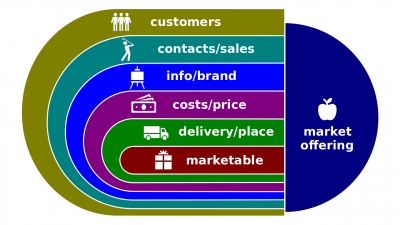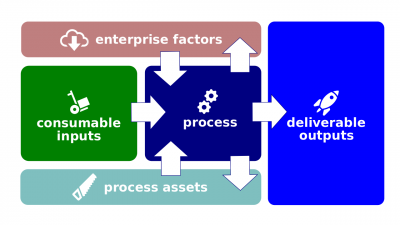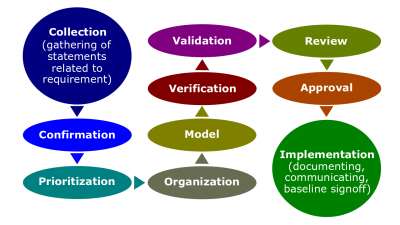Difference between revisions of "Business"
(→Requirements) |
|||
| (16 intermediate revisions by 3 users not shown) | |||
| Line 1: | Line 1: | ||
| − | [[File:Business-model-canvas.png|400px|thumb|right|[[Business Model Canvas]]]][[Business]] is some sequence of [[enterprise effort]]s undertaken in order to make profit and/or obtain other gains | + | [[File:Business-model-canvas.png|400px|thumb|right|[[Business Model Canvas]]]][[Business]] is some sequence of [[enterprise effort]]s undertaken in order to make profit and/or obtain other gains. |
| − | |||
| + | ==Definitions== | ||
| + | According to the [[BABOK Guide|BABOK Guide (3rd edition)]], | ||
| + | :[[Business]] (business world). An economic system where any commercial, industrial, or professional activity is performed for profit. | ||
| + | |||
| + | ===Way of making one's living=== | ||
| + | :''Business'' can be an individual's regular [[occupation]], profession, or trade. | ||
| + | |||
| + | ===Way of making money=== | ||
| + | :''Business'' can also be the practice of making [[money]] by selling [[market exchangeable]]s, which can be purchased, produced, or both. | ||
| + | |||
| + | ===For-profit entity=== | ||
| + | :Colloquially, a for-profit [[legal entity]] is often called a ''business''. However, [[legal entity|legal entiti]]es are usually engaged in more than one ''business''; vice versa, some [[organization]]s distinguish several [[strategic business unit]]s ([[strategic business unit|SBU]]'s) within one [[enterprise]]. | ||
==Startup== | ==Startup== | ||
| Line 29: | Line 40: | ||
===Products=== | ===Products=== | ||
| − | :''Main wikipage: [[ | + | :''Main wikipage: [[Market exchangeable]]'' |
| − | :[[File:Product.png|400px|thumb|right|[[ | + | :[[File:Product.png|400px|thumb|right|[[Marketable]]]]A [[market exchangeable]] is any item of goods, services, or any intangible that can be sold. |
===Processes=== | ===Processes=== | ||
| Line 41: | Line 52: | ||
===Transactions=== | ===Transactions=== | ||
| − | :''Main wikipage: [[ | + | :''Main wikipage: [[Market transaction]]'' |
===Policies=== | ===Policies=== | ||
| Line 70: | Line 81: | ||
[[business law]] | [[business law]] | ||
| − | A very detailed and well-established body of rules that evolved over a very long period of time applies to commercial transactions. The need to regulate trade and commerce and resolve business disputes helped shape the creation of law and courts. | + | A very detailed and well-established body of rules that evolved over a very long period of time applies to commercial transactions. The need to regulate trade and commerce and resolve business disputes helped shape the creation of law and courts. |
In many countries, it is difficult to compile all the laws that can affect a business into a single reference source. Laws can govern treatment of labour and employee relations, [[Health and Safety Executive|worker protection and safety]], discrimination on the basis of age, gender, disability, race, and in some jurisdictions, sexual orientation, and the minimum wage, as well as [[Trade union|unions]], worker compensation, and working hours and leave. | In many countries, it is difficult to compile all the laws that can affect a business into a single reference source. Laws can govern treatment of labour and employee relations, [[Health and Safety Executive|worker protection and safety]], discrimination on the basis of age, gender, disability, race, and in some jurisdictions, sexual orientation, and the minimum wage, as well as [[Trade union|unions]], worker compensation, and working hours and leave. | ||
| Line 88: | Line 99: | ||
=== Intellectual property === | === Intellectual property === | ||
| − | |||
Businesses often have important "[[intellectual property]]" that needs protection from competitors for the company to stay profitable. This could require [[patent]]s, [[copyright]]s, [[trademark]]s, or preservation of [[trade secret]]s. Most businesses have names, logos, and similar branding techniques that could benefit from trademarking. Patents and copyrights in the United States are largely governed by federal law, while trade secrets and trademarking are mostly a matter of state law. Because of the nature of intellectual property, a business needs protection in every jurisdiction in which they are concerned about competitors. Many countries are signatories to international [[treaty|treaties]] concerning intellectual property, and thus companies registered in these countries are subject to national laws bound by these treaties. In order to protect trade secrets, companies may require employees to sign noncompete clauses which will impose limitations on an employee's interactions with stakeholders, and competitors. | Businesses often have important "[[intellectual property]]" that needs protection from competitors for the company to stay profitable. This could require [[patent]]s, [[copyright]]s, [[trademark]]s, or preservation of [[trade secret]]s. Most businesses have names, logos, and similar branding techniques that could benefit from trademarking. Patents and copyrights in the United States are largely governed by federal law, while trade secrets and trademarking are mostly a matter of state law. Because of the nature of intellectual property, a business needs protection in every jurisdiction in which they are concerned about competitors. Many countries are signatories to international [[treaty|treaties]] concerning intellectual property, and thus companies registered in these countries are subject to national laws bound by these treaties. In order to protect trade secrets, companies may require employees to sign noncompete clauses which will impose limitations on an employee's interactions with stakeholders, and competitors. | ||
| − | ==Related | + | ==See also== |
| − | *[[Enterprise Architecture Quarter]]. | + | |
| + | ===Related lectures=== | ||
| + | :*[[What Career Is]]. | ||
| + | :*[[Enterprise Architecture Quarter]]. | ||
| − | [[Category: Septem Artes Administrativi]][[Category: Articles]] | + | [[Category: CNM Cyber Orientation]][[Category: Septem Artes Administrativi]][[Category: Articles]][[Category: Business Analysis]] |
Latest revision as of 17:32, 6 May 2023
Business is some sequence of enterprise efforts undertaken in order to make profit and/or obtain other gains.
Contents
Definitions
According to the BABOK Guide (3rd edition),
- Business (business world). An economic system where any commercial, industrial, or professional activity is performed for profit.
Way of making one's living
- Business can be an individual's regular occupation, profession, or trade.
Way of making money
- Business can also be the practice of making money by selling market exchangeables, which can be purchased, produced, or both.
For-profit entity
- Colloquially, a for-profit legal entity is often called a business. However, legal entities are usually engaged in more than one business; vice versa, some organizations distinguish several strategic business units (SBU's) within one enterprise.
Startup
- Main wikipage: Startup business
Startup business (or, simply, startup). (1) A business in its search of its business model, which usually means ways not to depend on external funding; (2) An enterprise in the early stages of operations. Startups are usually seeking to solve a problem of fill a need, but there is no hard-and-fast rule for what makes a startup since situations differ. Often, a company is considered a startup until they stop referring to themselves as a startup.
Canvas
- Main wikipage: Business Model Canvas
Capital
When businesses need to raise money (called capital), they sometimes offer securities for sale.
Capital may be raised through private means, by an initial public offering or IPO on a stock exchange, or in other ways.
Major stock exchanges include the Shanghai Stock Exchange, Singapore Exchange, Hong Kong Stock Exchange, New York Stock Exchange and NASDAQ (the USA), the London Stock Exchange (UK), the Tokyo Stock Exchange (Japan), and Bombay Stock Exchange (India). Most countries with capital markets have at least one.
Businesses that have gone public are subject to regulations concerning their internal governance, such as how executive officers' compensation is determined, and when and how information is disclosed to shareholders and to the public. In the United States, these regulations are primarily implemented and enforced by the United States Securities and Exchange Commission (SEC). Other western nations have comparable regulatory bodies. The regulations are implemented and enforced by the China Securities Regulation Commission (CSRC) in China. In Singapore, the regulatory authority is the Monetary Authority of Singapore (MAS), and in Hong Kong, it is the Securities and Futures Commission (SFC).
The proliferation and increasing complexity of the laws governing business have forced increasing specialization in corporate law. It is not unheard of for certain kinds of corporate transactions to require a team of five to ten attorneys due to sprawling regulation. Commercial law spans general corporate law, employment and labor law, health-care law, securities law, mergers and acquisitions, tax law, employee benefit plans, food and drug regulation, intellectual property law on copyrights, patents, trademarks, telecommunications law, and financing.
Other types of capital sourcing include crowdsourcing on the Internet, venture capital, bank loans, and debentures.
Model
- Main wikipage: Business model
Products
- Main wikipage: Market exchangeable
- A market exchangeable is any item of goods, services, or any intangible that can be sold.
Processes
- Main wikipage: Business process
natural business year, business process management
Development
- Main wikipage: Business development
Transactions
- Main wikipage: Market transaction
Policies
- Main wikipage: Business rule
Strategy
Competition
- Main wikipage: Competitive strategy
Behavior
- Main wikipage: Business strategy
business goal, business objective, business value
Analysis for a change
- Main wikipage: Business analysis
Needs
- Main wikipage: Business need
Requirements
- Main wikipage: Business requirement
Legal regulations
- Main wikipage: Commercial law
A very detailed and well-established body of rules that evolved over a very long period of time applies to commercial transactions. The need to regulate trade and commerce and resolve business disputes helped shape the creation of law and courts.
In many countries, it is difficult to compile all the laws that can affect a business into a single reference source. Laws can govern treatment of labour and employee relations, worker protection and safety, discrimination on the basis of age, gender, disability, race, and in some jurisdictions, sexual orientation, and the minimum wage, as well as unions, worker compensation, and working hours and leave.
Some specialized businesses may also require licenses, either due to laws governing entry into certain trades, occupations or professions, that require special education or to raise revenue for local governments. Professions that require special licenses include law, medicine, piloting aircraft, selling liquor, radio broadcasting, selling investment securities, selling used cars, and roofing. Local jurisdictions may also require special licenses and taxes just to operate a business.
Some businesses are subject to ongoing special regulation, for example, public utilities, investment securities, banking, insurance, broadcasting, aviation, and health care providers. Environmental regulations are also very complex and can affect many businesses.
Administration
Main wikipage: Business administration
External research
Main wikipages: Business opportunity and Business threat
Internal research
Main wikipage: Business intelligence
Intellectual property
Businesses often have important "intellectual property" that needs protection from competitors for the company to stay profitable. This could require patents, copyrights, trademarks, or preservation of trade secrets. Most businesses have names, logos, and similar branding techniques that could benefit from trademarking. Patents and copyrights in the United States are largely governed by federal law, while trade secrets and trademarking are mostly a matter of state law. Because of the nature of intellectual property, a business needs protection in every jurisdiction in which they are concerned about competitors. Many countries are signatories to international treaties concerning intellectual property, and thus companies registered in these countries are subject to national laws bound by these treaties. In order to protect trade secrets, companies may require employees to sign noncompete clauses which will impose limitations on an employee's interactions with stakeholders, and competitors.



